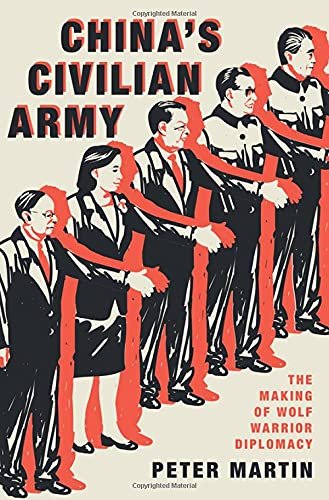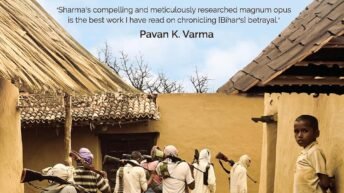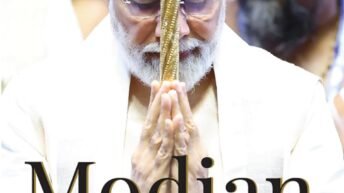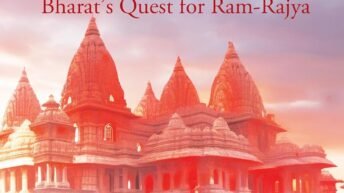|
Listen to article
Getting your Trinity Audio player ready...
|

Diplomacy generally means sophistication and statesmanship. If diplomacy were to be identified with its antonyms like impoliteness and rudeness, one country that comes to mind is China. Over the years, its diplomats have acquired a reputation as “wolf warriors”.
“Wolf Warrior” is a movie series in China which became a huge hit in 2017. Wolf Warrior 2, the second in the series, tells the story of a group of People’s Liberation Army soldiers who were sent to rescue stranded Chinese civilians in a war-torn African nation. The movie’s tagline proudly proclaims – “Even though a thousand miles away, anyone who affronts China will pay”.
“The moniker captured the intimidating and sometimes bewildering nature of Chinese diplomacy as seen by the outside world, and it stuck”, writes Peter Martin in his excellent book “China’s Civilian Army – The Making of Wolf Warrior Diplomacy”. Martin’s book is not just about the evil manners of the Chinese diplomats, but the entire history of how the Communist nation has viewed and developed its international relations infrastructure.
Many countries, including India, have experienced the aggressive, often undiplomatic, behaviour of Chinese diplomats. Zha Liyou, China’s consul-general in Kolkata, was so enraged by a tweet last year that he retorted angrily saying, “you speak in such a way that you look like part of the virus and you will be eradicated just like virus. Shame on you”.
Martin gives several such examples of the high-handed actions of the Chinese diplomats in his book. At a Pacific Islands Forum in the Micronesian state of Nauru, China’s envoy walks out of a meeting when the host refused to let him speak ahead of another nation’s prime minister, prompting the president of Nauru to call him as “very insolent” and a “bully”.
In Stockholm, the Chinese diplomat Gui Congyou became notorious for his provocative utterances. “In the space of just two years, Gui was summoned by Sweden’s foreign ministry more than forty times while three of the country’s political parties called for him to be expelled”, Martin writes. Unabashed, Gui told Swedish public radio, “we treat our friends with fine wine, but for our enemies we have shotguns.”
Liu Xiaoming, China’s ambassador in London, one of the most outspoken envoys, defended the aggressive behaviour of his colleagues stating that the “Chinese diplomats need to fight wolf wars because there are wolves in this world”.
China spends billions of dollars on diplomacy. While countries like the United States have slashed their diplomatic spending, China increased it to over $8 Billion in the last decade. With 276 embassies and consulates across the world and over 6000 diplomats on the rolls, it is the second largest diplomatic force after the US today. Yet, the wolf-warrior nature of its diplomats has earned the country a negative reputation in the world. They have become, in Martin’s words, “symbols of the threat posed by a rising China”.
Has Chinese diplomacy been the same from the beginning? Martin traces that history from the time Mao had instructed Chou Enlai to build a diplomatic corps for the newly liberated Communist country. When the country was “liberated” by the Red Army in 1949, it developed a syndrome of victimhood. History of “national humiliation” – from the Opium Wars to the Japanese occupation – dominated the psyche of its leadership, especially Mao. The only way to gain respectability, Mao believed, was to fight for it. Diplomats were instructed to stand up more aggressively for China with a “fighting spirit”.
That’s why he decided to make his generals in the Red Army the first batch of diplomats. It was a “caves to capitals” journey for them. Diplomatic niceties were not exactly the priority.
Following Mao’s advice, Chou told the new generals-turned-diplomats that the “diplomatic personnel are the People’s Liberation Army in civilian clothing”. After the first batch of these ambassador-designates was introduced, “Mao looked pleased”, Martin writes. “Ambassador generals are good. Ambassador generals won’t run away”, Mao commented.
Martin narrates a funny incident. After the meeting, it was time to practice. The generals lined up to present their credentials to a colleague who was pretending to be the Indian president. No one had wanted to take the risk of pretending to be Mao.
But the attitude improved over decades as the engagement of China increased with the rest of the world. The first big occasion came in late July 1954, when China was invited to a Soviet-initiated meeting of the “big five” victors of the Second World War (the United States, Britain, France, the Soviet Union, and China). Chou Enlai and a group of Chinese diplomats dressed in black Mao suits arrived at Montfleury Villa just outside Geneva, Switzerland for the meeting.
Chou realised that this was a historic opportunity. Not all were very welcome. President Dwight D. Eisenhower told British prime minister Winston Churchill that he opposed allowing “the bloody Chinese aggressor into the councils of peaceful nations”. Secretary of State John Foster Dulles said he would not meet with Chou at Geneva “unless our automobiles collide”.
Chou patiently worked on them and also many others. Soon his efforts started yielding results. At the Bandung conference of the Non-Aligned Nations in 1955, Chou emerged as the center of attraction and his name found more mentions than that of Nehru’s in the international media. During the most difficult Cultural Revolution period, Chau ensured that their diplomats worked diligently to manage global opinion.
The jewel in Chou’s crown was the visit of Kissinger, followed by Nixon’s to Beijing in 1971-72, the year that brought China into the United Nations. “Britain, France, Holland, Belgium, Canada, and Italy have all become Red Guards, rebelling against America and voting for us,” Chou declared proudly about UN recognition.
The architect of Chinese diplomacy died in 1976. The later leadership, under Deng Xiaoping, continued the tradition. Adversities continued. When Premier Li Peng attended the World Economic Forum at Davos in 1992, Western media dubbed him the “butcher of Beijing”, highlighting the Tiananmen massacre. However, the leadership persisted. Towards the end of the century came the admission into the WTO and in July 2001, the International Olympic Committee had decided to host the 2008 Summer Olympics in Beijing – a great victory for a country seen as a pariah by the West for decades.
In fact, by then, the stock of the country started raising so high that when in 2003, Bush and Hu Jintao spoke on consecutive days at the Australian parliament, Hu was greeted far more enthusiastically than Bush, and Australia’s Financial Review led with the headline, “Bush came, Hu conquered.”
However, Xi Jinping’s rise coincided with Chinese diplomacy going back to the Maoist moorings. Xi’s ambition for China’s rise and insistence on a “new type of relationship among major countries” began a new phase that became popular as the “Wolf-warrior diplomacy”.
Not all are impressed though. Yuan Nansheng, China’s former consul general in San Francisco, called for a return to the low-key approach to diplomacy the country had followed in the 1990s and early 2000s. “Chinese diplomacy needs to be stronger, not just tougher” he said.
“Chinese diplomats serve a political system that distrusts the outside world, which limits meaningful contact with foreigners and makes it difficult to win hearts and minds”, comments Martin in this informative and insightful book.
A must read for all China watchers.






Add comment